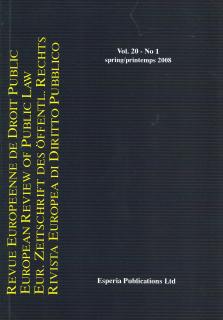
La sécurité européenne: Pologne
(European Security: Poland)
Krzysztof Wojtyczek
Université Jagellonne, Cracovie, Pologne
In the globalisation era, the nation State is losing its capacity to resolve the economical and social problems because these acquire a global dimension. The transfer of competences in the field of security, respecting the subsidiarity principle, does not cut down on the popular sovereignty which anyway cannot be extended to the global problems and thus remains restricted to national questions. The third pillar of the European Union also confronts the problem of the judicial deficit, and more precisely of the deficit of the instruments ensuring the respect of the objective law both by the European Union and by the national public powers, of the deficit of the efficient guarantees of fundamental rights. The Polish Parliament has made an effort to offset the negative effects of the transfer of competences regarding its powers, by adopting the law of 11 March 2004 concerning the collaboration of the Council of Ministers with the Diet and the Senate on the questions pertaining to the membership of the Republic of Poland in the European Union. This law provides for a unique procedure, which can be applied in all three pillars, for the formulation of the Polish position in the issuing of acts of the European Union having either a direct effect or not. The most interesting constitutional questions in Poland have been raised by the framework decision relating to the European Arrest Warrant. The introduction of this instrument in Poland ended up to an important decision of the Constitutional Court censoring the Polish law implementing the framework decision and also to a constitutional revision in order to permit the implementation of this instrument to the Polish nationals.
A l'époque de la mondialisation, l'Etat-nation perd sa capacité de résoudre les problèmes économiques et sociaux car ceux-ci acquièrent une dimension globale. Le transfert des compétences dans le domaine de sécurité, dans le respect du principe de subsidiarité, n'ampute pas la souveraineté populaire qui de toute façon ne peut s'étendre aux problèmes de dimension globale et se limite aux questions de dimension nationale. Le troisième pilier de l'Union européenne est confronté aussi au problème du déficit juridique, et plus précisément du déficit des instruments qui assurent le respect du droit objectif tant par l'Union européenne que par les pouvoirs publics nationaux, du déficit des garanties efficaces des droits fondamentaux. Le parlement polonais a essayé de compenser les effets négatifs du transfert des compétences pour ses pouvoirs, en adoptant la loi du 11 mars 2004 concernant la collaboration du Conseil des ministres avec la Diète et le Sénat sur les questions liées à l'appartenance de la République de Pologne à l'Union européenne. Cette loi organise une procédure unique, applicable à tous les trois piliers, de la formulation de la position polonaise dans l'édiction des actes de l'Union européenne qu'ils aient ou non des effets directs. Les questions constitutionnelles les plus intéressantes en Pologne ont été soulevées par la décision-cadre relative au mandat d'arrêt européen. L'introduction de cet instrument en Pologne a abouti à une décision importante de la Cour constitutionnelle censurant la loi polonaise mettant en œuvre la décision-cadre ainsi qu'à une révision constitutionnelle pour permettre l'application de cet instrument aux nationaux polonais.





















